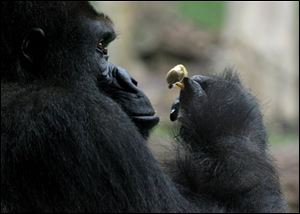
Health woes catching up to zoo's gorilla patriarch
11/12/2005
Akbar relaxes with part of an apple snack at the Toledo Zoo. Keepers say the 29-year-old silverback has a heart ailment.
When Dad says it's time to go outside, 3 1/2-year-old Juba skitters away, leading the gorilla patriarch up and down and around the enclosure.
It's a special game between father and son.
But Juba doesn't do that anymore. And Juba's foster mother, Elaine, has relinquished her need for a special invitation from the silverback every time the troupe moves.
Even devilish Kitani, the youngest female in Akbar's harem, is picking fewer fights for Akbar to break up.
"It's like they kind of understand," said Char Petiniot, the keeper who has been with 29-year-old Akbar since he arrived at the Toledo Zoo two decades ago.
The truth is, Akbar is dying.
"He has some good days. He has some bad days. But even the good days are less and less good. We all just want to make him comfortable," Ms. Petiniot said.
Zoo staff had their worst fears confirmed in August when an echocardiogram revealed the silverback's heart was diseased, without much ability for efficient contractions, said Randi Meyerson, the zoo's curator of mammals.
Heart failure is a common cause of death in male gorillas. Though gorillas can live into their 50s in captivity, the average life span is closer to 35 years.
When weather allows, Ms. Petiniot lets Akbar and his family out into The Meadow, the larger of the zoo's two outdoor gorilla exhibits. Normally, the zoo's two gorilla troupes take turns occupying that grassy space. But The Meadow is Akbar's favorite.
"Akbar can have whatever he wants. I'm spoiling him," Ms. Petiniot said.
Indoors, he likes to lie beneath a heat lamp.
"His circulation isn't good. He gets cold easily," Ms. Petiniot said.
Essential to lengthening Akbar's life is getting the gorilla to take full doses of the medicines he needs, Ms. Meyerson said. But that's not easy.
Akbar is so suspicious that his food contains medicine that he's been known to eat the banana skin and throw out the banana. But mostly, he's just not hungry.
"Every night, we go through the refrigerator to see what he would like," Ms. Petiniot said. One day it's little green apples. Then prunes. For awhile, he'd eat a bit of cottage cheese. Then saltines and peanut butter, or sunflower seeds.
"It's hard to stick a pill in a sunflower seed," Ms. Meyerson said.
Cardiologists recommend that Akbar receive between 30 milligrams and 50 milligrams of beta blocker daily. But every time keepers increase his medicine a tiny bit, "he crashes" - falling into lethargy, Ms. Petiniot said.
After three months of trying, his dose is only 15 milligrams.
Akbar is losing weight. In his prime, he weighed 420 pounds. A week ago, he was down to 349.
Complicating the eating and the medicines are the offspring: Juba and 3-year-old Nia Lewa.
"He's so tolerant of the kids, and Nia and Juba are like little vultures. Anything you give him, he doesn't want. He drops it right there," and the little ones scramble for it. Even 11-year-old Kitani will get into that act.
So far, though, the youngsters have ingested the silverback's medicine only a few times.
"I think they got a thyroid [pill] once and once I think they got a diuretic, but small doses," Ms. Petiniot said.
But the father of eight - seven born in Toledo - likes his family around, even the little troublemakers.
It's hard to believe this is the same gorilla that keepers once feared to allow around infants. When Akbar sired his first infant at the zoo in New Orleans, he was very young for fatherhood.
"He actually threw the baby in the moat. He wanted to play and the mother was taking care of the baby, so he thought maybe if we just got rid of the baby."
The baby was rescued.
"But he's been wonderful with the kids. [In New Orleans], he was young and an idiot, but that's the way they are. It's too bad he couldn't live another 10 years. He's been kind of the core of our gorilla program out here.
"I would hope that he could just remain with his family until the end. I can't imagine him by himself," Ms. Petiniot said.
Contact Jenni Laidman at:
jenni@theblade.com
or 419-724-6507.